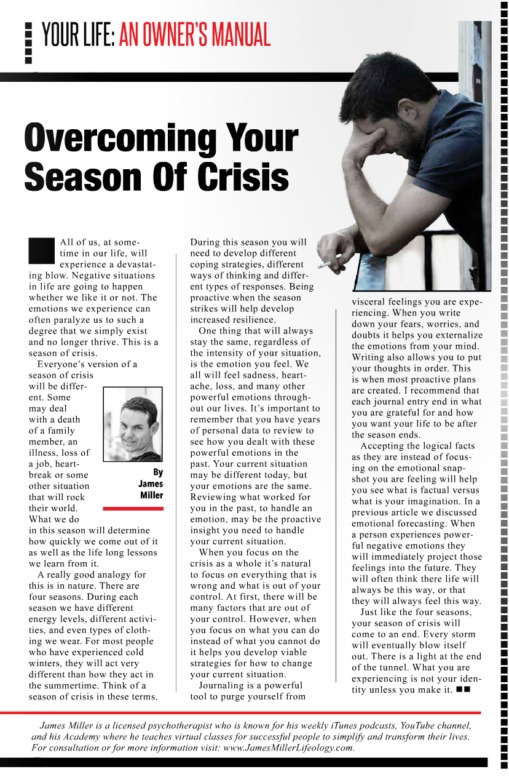All of us, at sometime in our life, will experience a devastating blow. Negative situations in life are going to happen whether we like it or not. The emotions we experience can often paralyze us to such a degree that we simply exist and no longer thrive. This is a season of crisis.
Everyone’s version of a season of crisis will be different. Some may deal with a death of a family member, an illness, loss of a job, heartbreak or some other situation that will rock their world. What we do in this season will determine how quickly we come out of it as well as the life long lessons we learn from it.
A really good analogy for this is in nature. There are four seasons. During each season we have different energy levels, different activities, and even types of clothing we wear. For most people who have experienced cold winters, they will act very different than how they act in the summertime. Think of a season of crisis in these terms. During this season you will need to develop different coping strategies, different ways of thinking and different types of responses. Being proactive when the season strikes will help develop increased resilience.
One thing that will always stay the same, regardless of the intensity of your situation, is the emotion you feel. We all will feel sadness, heartache, loss, and many other powerful emotions throughout our lives. It’s important to remember that you have years of personal data to review to see how you dealt with these powerful emotions in the past. Your current situation may be different today, but your emotions are the same. Reviewing what worked for you in the past, to handle an emotion, may be the proactive insight you need to handle your current situation.
When you focus on the crisis as a whole it’s natural to focus on everything that is wrong and what is out of your control. At first, there will be many factors that are out of your control. However, when you focus on what you can do instead of what you cannot do it helps you develop viable strategies for how to change your current situation.
Journaling is a powerful tool to purge yourself from visceral feelings you are experiencing. When you write down your fears, worries, and doubts it helps you externalize the emotions from your mind. Writing also allows you to put your thoughts in order. This is when most proactive plans are created. I recommend that each journal entry end in what you are grateful for and how you want your life to be after the season ends.
Accepting the logical facts as they are instead of focusing on the emotional snapshot you are feeling will help you see what is factual versus what is your imagination. In a previous article we discussed emotional forecasting. When a person experiences powerful negative emotions they will immediately project those feelings into the future. They will often think there life will always be this way, or that they will always feel this way.
Just like the four seasons, your season of crisis will come to an end. Every storm will eventually blow itself out. There is a light at the end of the tunnel. What you are experiencing is not your identity unless you make it.
James Miller is a licensed psychotherapist who is known for his weekly iTunes podcasts, YouTube channel, and his Academy where he teaches virtual classes for successful people to simplify and transform their lives. For consultation or for more information visit: www.JamesMillerLIFEOLOGY.com.


 We all get overwhelmed and sometimes don’t know what to do. LIFE LESSONS is your new “go-to” book to help you navigate life.
We all get overwhelmed and sometimes don’t know what to do. LIFE LESSONS is your new “go-to” book to help you navigate life.